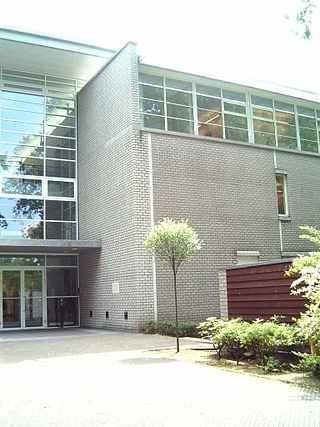Psycholinguistics or psychology of language is the study of the interrelation between linguistic factors and psychological aspects. The discipline is mainly concerned with the mechanisms by which language is processed and represented in the mind and brain; that is, the psychological and neurobiological factors that enable humans to acquire, use, comprehend, and produce language.
Elizabeth Ann Bates was a professor of cognitive science at the University of California, San Diego. She was an internationally renowned expert and leading researcher in child language acquisition, psycholinguistics, aphasia, and the neurological bases of language, and she authored 10 books and over 200 peer-reviewed articles and book chapters on these subjects. Bates was well known for her assertion that linguistic knowledge is distributed throughout the brain and is subserved by general cognitive and neurological processes.
Bilingualism, a subset of multilingualism, means having proficiency in two languages. A bilingual individual is traditionally defined as someone who understands and produces two languages on a regular basis. A bilingual individual's initial exposure to both languages may start in early childhood, e.g. before age 3, but exposure may also begin later in life, in monolingual or bilingual education. Equal proficiency in a bilingual individuals' languages is rarely seen as it typically varies by domain. For example, a bilingual individual may have greater proficiency for work-related terms in one language, and family-related terms in another language.
Ellen Bialystok, OC, FRSC is a Canadian psychologist and professor. She carries the rank of Distinguished Research Professor at York University in Toronto, Ontario where she is director of the Lifespan Cognition and Development Lab. She is also an associate scientist at the Rotman Research Institute of the Baycrest Centre for Geriatric Care.
Bimodal bilingualism is an individual or community's bilingual competency in at least one oral language and at least one sign language, which utilize two different modalities. An oral language consists of a vocal-aural modality versus a signed language which consists of a visual-spatial modality. A substantial number of bimodal bilinguals are children of deaf adults (CODA) or other hearing people who learn sign language for various reasons. Deaf people as a group have their own sign language(s) and culture that is referred to as Deaf, but invariably live within a larger hearing culture with its own oral language. Thus, "most deaf people are bilingual to some extent in [an oral] language in some form". In discussions of multilingualism in the United States, bimodal bilingualism and bimodal bilinguals have often not been mentioned or even considered. This is in part because American Sign Language, the predominant sign language used in the U.S., only began to be acknowledged as a natural language in the 1960s. However, bimodal bilinguals share many of the same traits as traditional bilinguals, as well as differing in some interesting ways, due to the unique characteristics of the Deaf community. Bimodal bilinguals also experience similar neurological benefits as do unimodal bilinguals, with significantly increased grey matter in various brain areas and evidence of increased plasticity as well as neuroprotective advantages that can help slow or even prevent the onset of age-related cognitive diseases, such as Alzheimer's and dementia.

James J. Jenkins is an American psychologist who played a significant role in the development of cognitive psychology.

Morton Ann Gernsbacher is an American psychologist who is Vilas Research Professor and Sir Frederic Bartlett Professor of Psychology at the University of Wisconsin–Madison. She is a specialist in autism and psycholinguistics and has written and edited professional and lay books and over 100 peer-reviewed articles and book chapters on these subjects. She is currently on the advisory board of the journal Psychological Science in the Public Interest and associate editor for Cognitive Psychology, and she has previously held editorial positions for Memory & Cognition and Language and Cognitive Processes. She was also president of the Association for Psychological Science in 2007.
Language production is the production of spoken or written language. In psycholinguistics, it describes all of the stages between having a concept to express and translating that concept into linguistic forms. These stages have been described in two types of processing models: the lexical access models and the serial models. Through these models, psycholinguists can look into how speeches are produced in different ways, such as when the speaker is bilingual. Psycholinguists learn more about these models and different kinds of speech by using language production research methods that include collecting speech errors and elicited production tasks.

The Max Planck Institute for Psycholinguistics is a research institute situated on the campus of Radboud University Nijmegen located in Nijmegen, Gelderland, the Netherlands. The institute was founded in 1980 by Pim Levelt, and is unique for being entirely dedicated to psycholinguistics, and is also one of the few institutes of the Max Planck Society to be located outside Germany. The Nijmegen-based institute currently occupies 2nd position in the Ranking Web of World Research Centers among all Max Planck institutes. It currently employs about 235 people.

Trevor Harley is emeritus chair of Cognitive Psychology. His primary research is in the psychology of language and consciousness. From 2003 until 2016 he was Head and Dean of the School of Psychology at the University of Dundee, Scotland, United Kingdom. He is author of several books, including "The Psychology of Language", currently in its fourth edition, published by Psychology Press, "Talking the talk", a book about the psychology of language (psycholinguistics) aimed at a more general audience, "The Science of Consciousness", a general text on consciousness, and "The Psychology of Weather", about how weather affects behaviour. He is a Fellow of the British Psychological Society.

Laura-Ann Petitto is a cognitive neuroscientist and a developmental cognitive neuroscientist known for her research and scientific discoveries involving the language capacity of chimpanzees, the biological bases of language in humans, especially early language acquisition, early reading, and bilingualism, bilingual reading, and the bilingual brain. Significant scientific discoveries include the existence of linguistic babbling on the hands of deaf babies and the equivalent neural processing of signed and spoken languages in the human brain. She is recognized for her contributions to the creation of the new scientific discipline, called educational neuroscience. Petitto chaired a new undergraduate department at Dartmouth College, called "Educational Neuroscience and Human Development" (2002-2007), and was a Co-Principal Investigator in the National Science Foundation and Dartmouth's Science of Learning Center, called the "Center for Cognitive and Educational Neuroscience" (2004-2007). At Gallaudet University (2011–present), Petitto led a team in the creation of the first PhD in Educational Neuroscience program in the United States. Petitto is the Co-Principal Investigator as well as Science Director of the National Science Foundation and Gallaudet University’s Science of Learning Center, called the "Visual Language and Visual Learning Center (VL2)". Petitto is also founder and Scientific Director of the Brain and Language Laboratory for Neuroimaging (“BL2”) at Gallaudet University.
Judith F. Kroll is a Distinguished Professor of Language Science at University of California, Irvine. She specializes in psycholinguistics, focusing on second language acquisition and bilingual language processing. With Randi Martin and Suparna Rajaram, Kroll co-founded the organization Women in Cognitive Science in 2001. She is a Fellow of the American Association for the Advancement of Science (AAAS), the American Psychological Association (APA), the Psychonomic Society, the Society of Experimental Psychologists, and the Association for Psychological Science (APS).
Neuroscience of multilingualism is the study of multilingualism within the field of neurology. These studies include the representation of different language systems in the brain, the effects of multilingualism on the brain's structural plasticity, aphasia in multilingual individuals, and bimodal bilinguals. Neurological studies of multilingualism are carried out with functional neuroimaging, electrophysiology, and through observation of people who have suffered brain damage.
Bilingual interactive activation plus (BIA+) is a model for understanding the process of bilingual language comprehension and consists of two interactive subsystems: the word identification subsystem and task/decision subsystem. It is the successor of the Bilingual Interactive Activation (BIA) model which was updated in 2002 to include phonologic and semantic lexical representations, revise the role of language nodes, and specify the purely bottom-up nature of bilingual language processing.

Bilingualism is the regular use of two fluent languages, and bilinguals are those individuals who need and use two languages in their everyday lives. A person's bilingual memories are heavily dependent on the person's fluency, the age the second language was acquired, and high language proficiency to both languages. High proficiency provides mental flexibility across all domains of thought and forces them to adopt strategies that accelerate cognitive development. People who are bilingual integrate and organize the information of two languages, which creates advantages in terms of many cognitive abilities, such as intelligence, creativity, analogical reasoning, classification skills, problem solving, learning strategies, and thinking flexibility.
Bilingual lexical access is an area of psycholinguistics that studies the activation or retrieval process of the mental lexicon for bilingual people.
Randi Martin is the Elma Schneider Professor of Psychology at Rice University and Director of the T. L. L. Temple Foundation Neuroplasticity Research Laboratory. With Suparna Rajaram and Judith Kroll, Martin co-founded Women in Cognitive Science in 2001, an organization supported in part through the National Science Foundation's ADVANCE Leadership program. She is a Fellow of the American Association for the Advancement of Science (AAAS) and the Society of Experimental Psychologists (SEP).
Kate Nation is an experimental psychologist and expert on language and literacy development in school age children. She is Professor of Experimental Psychology and Fellow of St. John's College of the University of Oxford, where she directs the ReadOxford project and the Language and Cognitive Development Research Group.
Debra Titone is a cognitive psychologist known for her research on bilingualism and multilingualism. She is currently a Professor of Psychology and a chair holder of Canada Research in Language & Multilingualism at McGill University. Titone is a founding member and officer of the professional society, Women in Cognitive Science. She and her colleagues have written about gender disparities in opportunities, along with the advancement of women the field of cognitive science, with specific reference to Canada.
Maria Fernanda Ferreira is a cognitive psychologist known for empirical investigations in psycholinguistics and language processing. Ferreira is Professor of Psychology and the Principal investigator of the Ferreira Lab at University of California, Davis.





